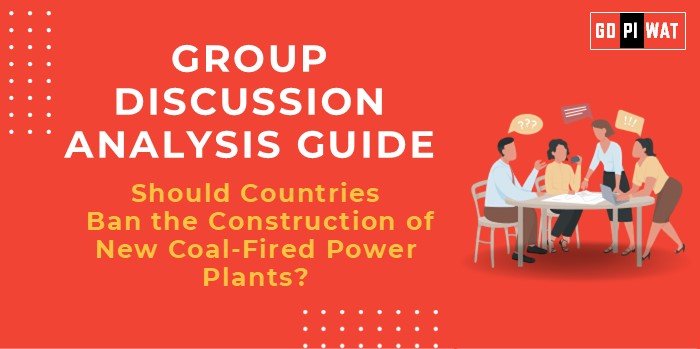📋 Group Discussion (GD) Analysis Guide
Should Countries Ban the Construction of New Coal-Fired Power Plants?
🌐 Introduction to the Topic
Context Setting: As the world confronts the dual challenges of climate change and energy demand, the role of coal-fired power plants has become increasingly controversial. Nations are debating whether to prioritize sustainability over economic growth by banning the construction of new coal-fired power plants.
Topic Background: Coal power plants have historically fueled industrialization, but their significant carbon emissions contribute to climate change. Recent developments, such as international agreements like the Paris Accord, emphasize reducing global greenhouse gas emissions, pushing countries toward cleaner energy sources.
📊 Quick Facts and Key Statistics
- Global CO₂ Emissions from Coal: 40% of global CO₂ emissions come from coal-fired power plants.
- Renewable Energy Costs: Solar and wind energy costs have dropped by over 80% since 2010.
- Energy Demand Growth: Global energy demand is expected to grow by 47% by 2050.
- Jobs in Renewable Energy: 12.7 million people were employed globally in renewable sectors in 2023.
- Health Impact: Coal pollution causes 800,000 premature deaths annually (World Bank 2023).
🏗️ Stakeholders and Their Roles
- Governments: Enact policies and regulations to phase out coal plants while ensuring energy security.
- Private Companies: Invest in renewable energy infrastructure and develop innovative solutions.
- International Organizations: Facilitate cooperation and provide funding for transitioning to cleaner energy sources.
- Communities: Advocate for cleaner energy while balancing livelihood concerns in coal-dependent areas.
🏆 Achievements and Challenges
✅ Achievements
- Renewable Energy Transition: Countries like Denmark and New Zealand are achieving high renewable energy percentages.
- Technological Advancements: Improved battery storage enables consistent renewable energy supply.
- Policy Progress: The EU’s coal phase-out plan is decarbonizing energy systems.
⚠️ Challenges
- Economic Dependency: Coal economies like India and South Africa face job losses and financial instability.
- Infrastructure Gaps: Renewable energy requires costly, time-intensive infrastructure development.
- Global Disparities: Developing nations struggle to fund renewable transitions compared to wealthier countries.
🌍 Global Comparisons
- Success: Germany has achieved a 50% reduction in coal usage through renewable subsidies.
- Challenges: Australia faces opposition due to reliance on coal exports for economic growth.
Case Study: India has reduced emissions by closing older coal plants while expanding renewable capacity.
💬 Structured Arguments for Discussion
- Supporting Stance: “Banning new coal-fired power plants aligns with global climate goals and fosters long-term economic growth through renewables.”
- Opposing Stance: “For developing nations, banning coal jeopardizes energy security and economic growth.”
- Balanced Perspective: “While bans can accelerate clean energy adoption, transitional support for coal-dependent regions is essential.”
📖 Effective Discussion Approaches
- Opening Approaches:
- Statistical Impact: “Coal contributes to 40% of global CO₂ emissions, making its phase-out crucial for climate goals.”
- Contrast Approach: “While renewables promise a sustainable future, coal remains a backbone for many economies.”
- Counter-Argument Handling:
- Emphasize renewable cost reductions.
- Highlight successful transitions in countries like Germany.
🔍 Strategic Analysis of Strengths and Weaknesses
- Strengths: Reduced emissions, renewable cost reductions, global support for decarbonization.
- Weaknesses: Economic impacts on coal-reliant areas, infrastructure challenges.
- Opportunities: Green job creation, technological innovation.
- Threats: Political resistance, energy shortfalls during transitions.
🎓 Connecting with B-School Applications
- Real-World Applications: Relevant for discussions on energy policy, sustainability, and corporate social responsibility.
- Sample Interview Questions:
- “What are the economic implications of banning coal-fired power plants?”
- “How can countries balance energy security and climate goals?”
- Insights for B-School Students: Explore case studies on energy transitions and engage in projects related to sustainable energy finance.


